Q.
Can foreigners own property in Panama?
A. Yes. All citizens and foreigners are equal under
the Panamanian Constitution. Anyone can own property
in Panama. And, while not required by Panamanian
law, it is advisable to establish a legal entity
to buy land and engage in the building or purchase
of a house.
Q.
Do foreigners enjoy the same property rights as
Panamanian citizens?
A. Yes, with one exception: foreigners cannot acquire
land within 10 kilometers of the country border
and on islands that have not been declared a special
development area.
Q.
Why do so many foreigners choose to buy a second
home or retirement home in Panama?
A. The main reason that foreign investors have targeted
Panama is cost. Property in Panama is relatively
affordable. Buyers can purchase highly-desirable
property in Panama for less than one third or one
half what they might pay for comparable property
in the U.S.
Buying property in Panama is safe and easy - foreigners
enjoy the same property rights as Panamanians. Additionally,
there is real estate readily available in Panama
to suit all budgets and tastes. From a luxurious
high-rise apartment, to a tropical beachfront condo,
or a breezy mountain retreat, there is a perfect
piece of Panama property for every type of person.
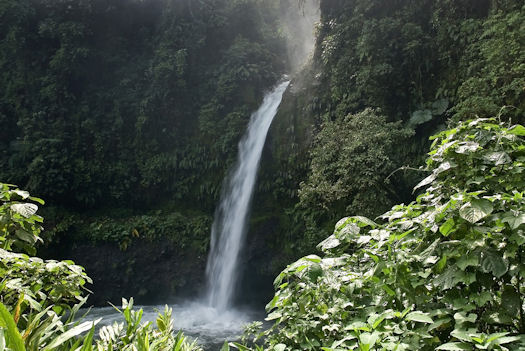
Q. What makes Panama appealing
besides affordable prices?
A.
Panama is the most North-American in makeup of any
nation in Latin America. Panama has most of the
conveniences found in the U.S. from Direct TV, to
American movies, to excellent health care. Plus,
the major cities have the amenities and comparable
infrastructure to the U.S.
Panama
is truly a tropical pardise with almost zero violent
crime and an extremely hospitable attitude toward
foreigners. The country is peaceful, has a low population
density and almost no pollution. It uses the U.S.
dollar as currency so there is never any currency
exchange issues.
Whether
investors just want a place where they can relax
on the beach and surf in the ocean waves, or relax
on a mountain top in the cool highlands, Panama
has it all.
Q.
Why is there a sudden surge in interest in Panama
property as an investment?
A.
Panama's recent vote to start a $5.2 billion expansion
of the Panama Canal will result in a huge injection
of money into Panama's economy. Canal officials
say the expansion, due to be concluded in 2014,
will create up to 40,000 jobs. By 2014, the Canal
is expected to contribute $1.3 billion a year to
the nation's treasury, up from $580 million today.
The entire country will benefit, and real estate,
especially property near the Canal, will likely
appreciate significantly.
Q.
How is title to property held in Panama?
A. The Republic of Panama has one of the most sophisticated
Public Registry systems in the region. The Public
Registry Office keeps records of all titled properties
in all nine provinces of Panama.
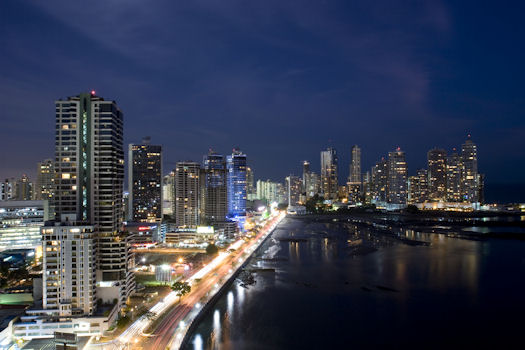
Q. Is Panama attractive to retirees?
A. Panama has tried to encourage foreign investment
by appealing to affluent retirees. For that reason,
the requirements to own property and establish permanent
residence are not nearly as onerous as in some other
countries.
Foreign
retirees who want to make their home in Panama must
get a pensioned tourist visa. This visa will include
the right to import up to $10,000 worth of possessions
for personal use duty-free, as well as the duty-free
import of a vehicle every two years.
A
huge plus for retirees, both foreign and domestic,
are discounts of 10%-50% at restaurants and hotels,
for transportation and many medical services, and
for some financial dealings.
Q.
What other retirement incentives are offered for
foreign investors in Panama?
A. Retirees are eligible for many outstanding incentives
that include:
-
Import
tax exemption for household goods
-
Tax exemption to import a new car every two years
-
25% discounts on utility bills
-
25% discount on airline tickets and 30% on other
transportation
-
15% discount on loans
-
1% reduction of home mortgages for homes used
for personal residence
-
20% discount on doctor's bills, 15% on hospital
services if no insurance applies
-
15% off dental and eye exams
-
10% discount on medicines
-
20% discount on bills for professional and technical
services
-
50% discount on entrance to movie theaters, cultural
and sporting events
-
50% discount at hotels during Monday to Thursday,
30% on weekends
Q: Does Panama offer any tax exemptions to foreign buyers?
A: Yes. This tax exemption is an exciting benefit of buying property in Panama and applies to nationals and foreigners who buy property in Panama.
A major incentive to buy a condo hotel unit, or any property for that matter, in Panama is the 20-year property tax exemption law. The law was first passed by the Panamanian government in 1990 as a way to encourage economic growth and investment. The exemption mandates that buyers of new homes or condos do not have to pay property tax for up to 20 years.

After several extensions to the law, it finally expired on August 31, 2007. But, the government saw the benefits of the exemption and introduced new ones of 5 to 15 years depending on a particular property's value.
Developers, real estate agents, and construction companies lobbied the government for the return of the 20-year 'blanket' exemption, but the government wouldn't budge, until now.
In late December, 2007, Panama extended the 20-year tax emption until the end of 2009. This means buyers who close on a property before December 31, 2009 are exempt from paying property tax for 20 years. Maybe it's time to take another look at Panama properties. Of course, buyers should check with a project's developer and/or their personal accountant to ensure that this law applies to their purchase.
Q.
When selling real estate property, does the seller
have to pay a transfer tax?
A. Yes, sellers of real estate are required to pay
a 2% tax for each transfer of property. Real estate
transfer tax can be offset as a direct credit against
the income tax levied on the capital gain arising
from the sale, if any.
Q. What types of property are foreign buyers purchasing
in Panama?
A.
Foreign buyers purchase single-family homes, condominiums
and also a relatively new type of real estate called
condo hotels.
Q.
What are condo hotels and why is it becoming popular
in Panama?
A.
The condo hotel concept has been rapidly gaining acceptance
all over the 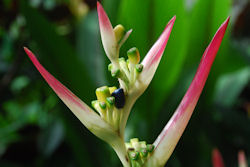 world. Panama has joined in by planning
to build several outstanding condo hotel resorts. world. Panama has joined in by planning
to build several outstanding condo hotel resorts.
The
condo hotels are four- or five-star resorts offering
fantastic amenities like full-service spas, fine-dining
restaurants, pools, concierge services and more.
These
vacation homes are ideally suited for international
people buying a second home because owners can use
their condo hotel unit when they want.
When
they're not in residence, their condo can be placed
in the hotel's rental program, and they will receive
a share of the revenue it generates.
Plus,
the hotel takes care of cleaning and maintaining the
property, operating its many amenities, and promoting
it to attract hotel guests. It is hassle-free second
home ownership at its best.
Q. Are Panama condo hotels appropriate for retirees?
A. Yes, they're an excellent solution for retirees
who may want to spend a few weeks or months a year
in a warm climate and a resort atmosphere but don't
want any of the typical responsibilities like property
maintenance associated with home ownership.
General
Information About Panama
Q.
What's the capital of Panama, and what are some major
cities?
A. Panama has two main cities: Panama City, the capital,
and Colon, on the Caribbean Coast.
Panama
City is the main economic center and Colon is a city
that houses the largest free trade zone in all of
the Americas. David is Panama's third most populous
city and is located at the center of a rich farming
region.
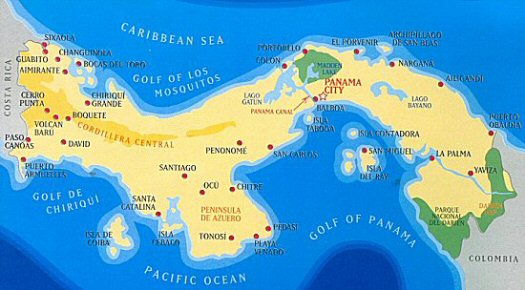
Q.
What about the government and economics of Panama?
A. The government of Panama is democratic and is trying
to make it easier for foreigners to buy real estate
and live in the country.
The
economy is broken down as follows: 74% service, 16%
industry, and 10% agricultural.
The
country's inflation rate has averaged less than 2%
per year over the past 40 years which is extremely
rare south of the United States. Panama's economy
is one of the best performing economies in Latin America.
Q.
What is the climate like in Panama?
A. In Panama, there are two distinct seasons: The
dry season-summer, or verano-(January-May); and the
rainy season-winter, or invierno-(May-December).
The
dry season is considered the tourist season. The rainy
season brings regular afternoon showers of short duration.
Panama City has a an average temperature of 78 degrees
F.
Q.
Where does the word "Panama" come from?
A. "Panama" means "abundance of fish"
in Indian language, and Panama lives up to this name
as a world-class sport fishing destination.
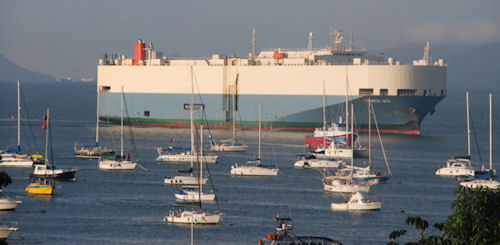
Q.
What is the best way to travel to Panama?
A. Panama has good air connections with destinations
throughout the Americas and part of the Caribbean
and Western Europe. International flights arrive at
and depart from Tocumen International Airport, 15
miles northeast of Panama City.
Carriers
serving Panama with nonstop or connecting flights
include:
American Airlines, Continental, Delta, Iberia, Air
Madrid, Copa (the national airline of Panama), TACA,
LACSA, and Cuban. Another international airport is
expected to open in Playa Blanca, Panama in 2008.
Panama's
gateway cities in the United States are Atlanta, Houston,
Los Angeles, Miami, Newark, Raleigh-Durham and Orlando.
The busiest flight is Miami-Panama City, which takes
just under three hours.
Q.
What are Panama's most popular attractions and tourist
activities?
A. The country's most famous attraction is, of course,
the Panama Canal, the world's grandest shortcut and
one of the great engineering marvels of all time.
It is currently undergoing a major expansion which
will greatly increase its capacity as well as attract
millions of visitors in the coming year. The U.S.
relinquished control of the Panama Canal in late 1999.
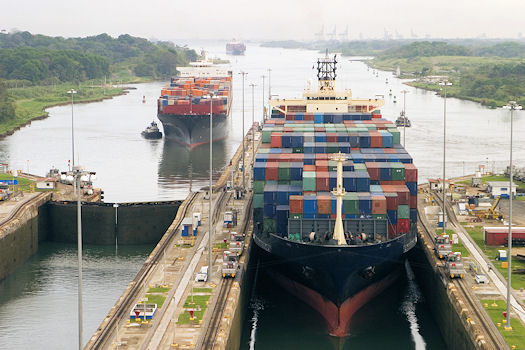
There
are several superb tourism activities that can be
easily reached from Panama City. There are five golf
courses in or near the city and beach areas. Dining
is excellent in Panama City, and there are numerous.
bars, discos and cafes. In addition, there is birding,
diving/snorkeling, ecotouring, fishing, hiking, rafting/kayaking,
surfing, and more.
The
Parque Nacional Coiba is one of Panamas's ecological
treasures, and its rich aquatic life has earned comparisons
to the Galapogos Islands.
Panama
boasts the largest number of bird species in Central
America. Bird watchers consider Panama as one of the
world's best birding sights.
Q.
What outdoor activities does Panama offer?
A. Panama's exciting attractions include world-class
deep sea and lake fishing, surfing, wild-water rafting,
kayaking and trekking throughout the country.
There
is also first-class diving and snorkeling in Bocas
del Toro, Coiba Island, the Pearl Islands, Isla Grande,
the Golfo de Chiriqui and even in the Panama Canal.
Q.
Is Panama safe?
A. Yes. Like many countries, Panama sees poverty  and
richness, and often the division is obvious. However,
Panamanians are very charming and welcome tourists
and foreign residents. and
richness, and often the division is obvious. However,
Panamanians are very charming and welcome tourists
and foreign residents.
Q.
What precautions should be taken to avoid health risks
while in Panama?
A. No special precautions are needed for travel in
Panama. The only exception would be for travelers
planning remote and uninhabited parts of the jungle
for several days.
Q.
What currency is used in Panama?
A. The U.S. dollar is the main currency in Panama.
Q.
Do most places in Panama accept American credit cards?
A. Yes. All major credit cards are widely accepted.
Traveler's checks are not as convenient as most banks
and hotels charge a fee for cashing them.
Q.
Are there any national parks in Panama?
A. South of the city of David, the Golfo de Chiriqui
is home to the "Parque Nacional Marino Golfo
de Chiriqui," an immense national marine park
protecting 25 islands, 19 coral reefs and an abundance
of wildlife.
Other
national parks located at the Peninsula de Azuero
are: Montuoso Forest, Reserve, Cerro Hoya National
Park, La Tronosa Forest Reserve, Isla Cañas
Wildlife Preserve, Isla Iguana Wildlife Refuge and
Peñón de la Onda Wildlife Preserve.
Q.
Is living in Panama like living in a third-world country?
A. No, not at all. Panama has a good infrastructure
with excellent services such as Internet access, cable
TV, good cell phone 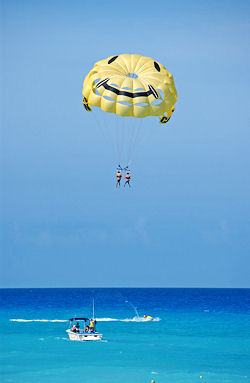 service and reception, access
to American-style products and services, and affordable
quality healthcare. service and reception, access
to American-style products and services, and affordable
quality healthcare.
In
many retirement havens, foreigners must give up many
of the technologies and amenities they enjoyed in
their home countries. But, in Panama, foreigners will
find that the country offers the state-of-the-art
benefits and conveniences usually found only first
world countries.
Q.
How does the cost of living in Panama compare with
the U.S.?
A. Prices are generally less expensive than in the
United States, but, as with most countries, things
are more expensive in the capital than in outlying
areas.
Food
prices can be comparable or less expensive depending
on whether the product is local or imported.
Healthcare is substantially less costly than in the
U.S.
Q.
Is hiring a maid feasible?
A. Definitely. Most homes are equipped with a maid's
quarters. Typical salary for a maid is approximately
$200 per month plus food and housing.
Q.
Does Panama offer good health insurance?
A. A number of companies offer a wide range of insurance
options. Premiums usually between $40 and $200 per
month, depending on coverage.
Also,
most doctors in Panama are educated in the U.S., and
quality standards in Panamanian hospitals often meet
the standards of hospitals in the U.S. There is at
least one hospital in each of the major cities of
Panama.
Q.
Can foreigners bring their dog or cat to Panama?
A.
Yes, foreigners can bring pets, and the country has
made this a very easy process. A veterinarian located
at the airport will inspect the animal and give it
any required shots.
Pet
owners will be charged a fee for the various forms
and shots, but the animal will not need to be quarantined.
Foreigners should bring all related paperwork for
their pet.
Q.
Does Panama have a reliable banking system?
A. Panama has about 90 banks. Of these 90, over 40
bear a general license, which allows them to provide
general banking services to local and foreign residents.
Panama's
banking system is well regulated, and differs from
other countries in that banks must have a physical
presence (offices, staff, operations, etc.) and comply
with all required laws and asset minimums, as well
as with banking rules and regulations.
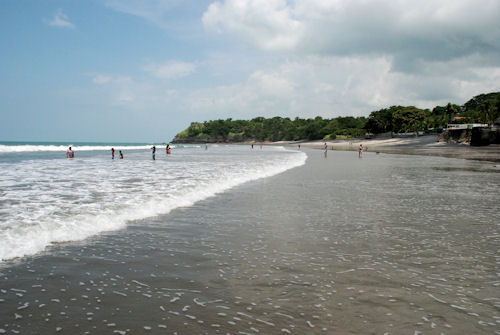
Q.
Do foreigners need a visa to visit Panama?
A. Most foreigners enter Panama with a Tourist Visa
or a Tourist Card, which allows them
to visit the country for a 30-day period. The visa
is renewable for two successive periods of 30 days
each, but, the request must be approved by visa authorities.
Currently,
almost all Latin Americans and U.S. citizens are allowed
to enter Panama with a "Tourist Card," which
can be obtained from nearly all airlines flying into
Panama, while the tourist visas are issued by the
Panamanian Consuls.
All
foreigners who stay in Panama for more than 30 days
must be registered with the Immigration Department
and will need an exit permit to leave the country.
A
valid passport is also required to enter the country.
Q.
How can a foreigner obtain a permanent resident visa?
A. Under Panamanian Immigration laws, there are different
kinds of visas that authorize an alien to reside in
Panama provided they meet the established requirements.
Tourist
Pensioner Visa (Turista Pensionada): this is designed
for people whose pension from a government entity
or private corporation is $500 or more ($600 or more
for a couple).
Private
Income Retiree Visa (Rentista Retirado): this visa
is designed for people who, despite not receiving
a monthly pension, are no longer working and have
received a lump sum retirement payment which may be
deposited into a five-year certificate of deposit
with the National Bank of Panama, yielding a minimum
of $750 a month.
Person
of Means Visa (Solvencia Económica Propia):
this visa is designed for those, not employed or starting
a business, but living of their own means. The person
must have a one-year certificate of deposit in any
bank in Panama with a minimum of $100,000. Upon applying
for renewal of the visa, the certificate must also
be renewed for one more year.
Investor
Visa (Inversionista): this visa is designed for those
who want to start a business in Panama with a minimum
investment of $100,000 and a minimum of three permanent
Panamanian employees employed.
Small
Business Investor Visa (Inversionista de Peque?a Empresa):
this visa is designed for those who wish to establish
a small business in Panama with a minimum investment
of $40,000 and a minimum of three permanent Panamanian
employees employed.
Q.
Is the visa application process difficult and expensive?
A. The visa process for the pensionado program is
very simple. It's a one-time application. There are
no renewals and no additional fees.
Other
visa programs require foreigners to file a renewal
each year. This involves time, paperwork, and additional
fees. The process takes only a couple of weeks and
the legal fees are about $1,500.
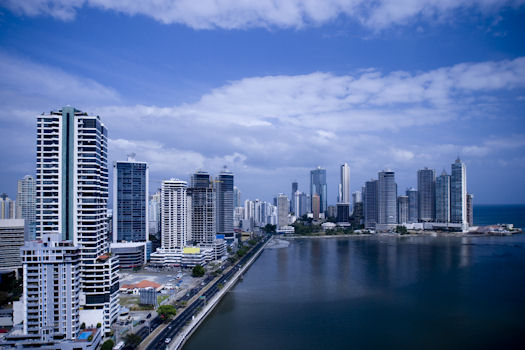
Q.
Are there general requirements when applying for a
visa?
A. Yes. All visas applications must be made through
a Panamanian lawyer. All overseas documents to be
presented to the authorities in Panama must be notarized
and authenticated by the Panamanian consulate or by
a notary and the Apostille.
The
Apostille (Via the Hague Convention of 1961) is a
quicker way of authenticating documents and is normally
obtained through the Secretary of State in the foreigner's
home state (in the United States) or through the Foreign
Office (in Great Britain). Canadians should check
with the Panamanian Embassy or consulate nearest them.
All
documents must be fresh, (within two months of visa
application) and passports must have at least one
year to run.
A
note regarding dependants: If a spouse will be covered
by your visa, the foreigner will need to bring a marriage
certificate. However, original marriage certificates
are not acceptable if over two months old, so foreigners
may need to obtain new ones.
If
children under 18 are to be covered by the visa, they'll
need to bring fresh birth certificates (not originals).
Q. Do foreigners who own property in Panama have to
pay income taxes in Panama?
A. The Panamanian Fiscal Code defines a taxpayer as
any person or entity (corporation or partnership),
national or foreign, receiving taxable income.
According
to the code, only income that is produced from any
source within the territory of the Republic of Panama
is subject to income tax, regardless of the place
where it is received. This means income from sources
outside Panama is not subject to taxes in Panama.
Q.
Do foreigners who live only part of the year in Panama
have to pay any income tax?
A. Foreigners, who spend 180 days or more in a calendar
year in Panama, are considered residents for income
tax purposes.
If
an individual remains in Panama fewer than 180 days
in a calendar year, and receives income from either
work or other activities in Panama, that individual
is taxed at a 15% fixed rate, plus an educational
tax of 2.75%.
Are
you interested in purchasing a second home in Panama?
To see what's available, visit our Featured
Properties of Panama.
*
The information above is general background about
purchasing property in Panama and is not meant as
a substitute for the advice of your attorney or accountant,
who can take into consideration your individual situation. |